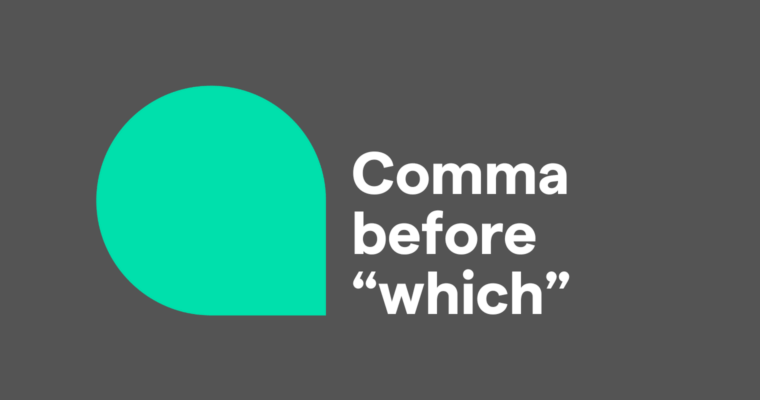
- Use a comma before which to introduce a nonrestrictive clause. Example: Sonny is wearing a large hat, which he bought at the flea market.
- Don’t use a comma before which when it’s part of a prepositional phrase, such as in which. Example: She wrote an essay in which she analyzed both books’ themes.
- Don’t use a comma before which to introduce direct or indirect questions. Example: Which major is the best fit for me? Example: My parents asked me which dates were best to visit.
- Restrictive clauses are usually introduced by that instead of which.
- Usually, there’s no comma after which. However, some exceptions apply.
Which is a versatile word. It’s a pronoun and a determiner, and in some instances, it’s both. A pronoun is a short word used in place of a noun to keep the language in a sentence or paragraph from becoming redundant. It’s used after the noun (i.e., the antecedent) is introduced. Here’s an example with the pronoun in bold:
A determiner is a word that’s used before a noun to describe the noun’s quantity or ownership. Here’s an example of a sentence with a determiner:
Because it’s so versatile, which shows up in a lot of different kinds of sentences. Sometimes, it needs a comma, and other times, it doesn’t. Read on to learn more about when which needs a comma and when it doesn’t.
Table of contents
Comma before which in nonrestrictive clauses
Comma before which in restrictive clauses
Comma before which in prepositional phrases
Comma before which in questions
Examples of comma before which in sentences
Do you need a comma after which?
Does which need a comma?
Whether which needs a comma or not depends on how it’s being used in a sentence. When it’s used with a nonrestrictive clause, the answer is yes. In nearly all other circumstances, the answer is no.
Comma before which in nonrestrictive clauses
A nonrestrictive clause is a clause or phrase that adds nonessential detail about a noun or noun phrase.
The sentence above includes a nonrestrictive phrase (in bold). In this sentence, the nonrestrictive clause is also an appositive. When which is used with a nonrestrictive clause or phrase, the whole phrase/clause needs to be preceded by a comma. When it’s an appositive, it often needs to be offset by commas.
Nonrestrictive clauses’ defining characteristic is that the details they add aren’t crucial to their sentences’ meaning. Here’s an example of the same sentence without the nonrestrictive clause:
Here are a few more examples of sentences that require a comma before which:
Comma before which in restrictive clauses
A restrictive clause is a clause that adds detail about a noun or noun phrase and changes the sentence’s meaning. They are used with one of the following relative pronouns:
- that
- who
- whom
- whose
Here’s an example of a restrictive clause in a sentence:
“The first person was Kiara” is a grammatically correct but bland sentence. It also doesn’t tell us much.
When do you use which vs. that?
In US English, that is always used with restrictive clauses, while which is used with nonrestrictive clauses. However, in UK English, a restrictive clause may use which. Here is an example of a restrictive clause that uses which:
In the sentence above, the bolded section is a restrictive phrase. If you remove it, the sentence’s meaning changes: The family is always throwing parties. This sentence could be about any party-loving family.
Now compare it to a sentence that uses which as part of a nonrestrictive clause:
See how the bolded section feels more like bonus detail than crucial information in this second example? Use commas to set off a clause beginning with which when the information in the clause can be removed from the sentence without significantly changing its meaning.
Comma before which in prepositional phrases
A prepositional phrase is a phrase that includes a preposition, its object, and any additional words that modify its object. Which is often used in prepositional phrases, and with these, which is not preceded by a comma.
Comma before which in questions
Which is also used in questions. In this position, it does not need a comma.
Example of a direct question
Example of an indirect question
Examples of comma before which in sentences
As we discussed earlier, which is preceded by a comma when it’s part of a nonrestrictive clause. Here are a few examples:
Do you need a comma after which?
Generally, you don’t need a comma after which. However, there is an exception to this rule: when which is followed by an interrupter.
An interrupter is essentially a side note in a sentence. It adds detail and, like a nonrestrictive clause, can be removed without significantly changing the sentence’s meaning. Here are a few examples of instances where you’d use a comma after which:
Comma before which FAQs
Is there a comma before which?
Whenever which begins a nonrestrictive clause, it is preceded by a comma.
When do you not need a comma before which?
When which follows a preposition as part of a prepositional phrase, when it introduces a direct or indirect question, and when it introduces a restrictive clause in UK English, there is no comma before it.
Can you use a semicolon instead of a comma before which?
No, it is not correct to use a semicolon instead of a comma before which.





